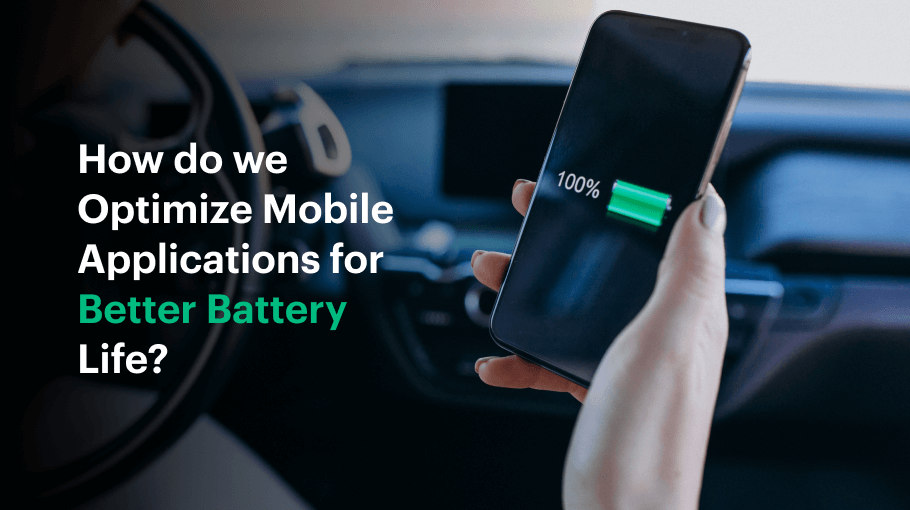
How to Optimize Mobile Apps for Better Battery Life: In the last few decades, mobile devices’ usage has increased, which led to the growth of mobile applications use. The developers take advantage of this growth to provide user-friendly and robust apps that can help businesses reach out to their customers. It is estimated in a survey that the average smartphone owner uses 30 apps each month, and around 57% of all digital media usage comes from these mobile apps.
In such a situation where mobile apps are used frequently, and high-resolution media is shared through it, there are chances of mobile battery life getting poor. To avoid such problems, the mobile app developers need to optimize mobile apps for better battery life in such a way that it can better the battery life of the device.
In this blog, we will learn how to optimize mobile apps for better battery life.
Why Optimize Mobile Apps for a Better Battery Life?
Mobile app developers often neglect the impact their app can have on the device’s battery life. This can also be because of the lack of background in embedded systems.
Read This: Best Ways to Validate Your Mobile App Idea
An app that needs more power can leave a wrong impression with the users, and it can also result in a bad review of the app. This has happened to most popular apps like Facebook. Therefore, to avoid bad reviews and create a good reputation in the users’ eyes, mobile app development must develop an app that consumes less battery.
How to Optimize Mobile Apps for a Better Battery Life?
When we talk about a smartphone’s battery life, it is one significant aspect of the mobile user experience. A mobile app that offers the latest updates and features tends to affect battery life. Still, few essential elements can be taken care of that mobile apps can be as respectful of battery life as possible. These aspects are as follows-
- First of All, Make the App Lazy
Making the app lazy means searching out for different ways to reduce and optimize the operations that are batter-intensive. The three essential questions that are asked in the Lazy First option are-
- Defer: Does the mobile app need to perform any action instantly? For instance, can the app wait for the device to get fully charged before taking the backup of the data on the cloud?
- Reduce: Is there any chance of having any redundant option that can cut out your app? For instance, does the app have the capability to cache the downloaded data instead of waking up the radio that can re-download it?
- Coalesce: Can the tasks of the apps be batched, instead of making the mobile device go through the active state multiple times? For example, can several apps send the messages together on the radio instead of separately sending their messages?
These questions must be answered when using the radio, the CPU, and the screen.
- Take Advantage of the Platform Features
The platform on which the app is going to get developed plays an essential role in battery usage. Some internal mechanisms help in conserving battery life. These mechanisms are different according to the OS it is for. The mechanisms are-
- Background Restrictions
- App Standby Buckets
- Testing & Troubleshooting
- Power Management Restrictions
- Make Use of Better Tools
When it comes to selecting the tools, it relies entirely on the platform you are working on. It helps in discovering the parts of your app that consume the most power. In Android, there are tools like Battery Historian and Profile GPU Rendering that can optimize for better battery life.
Read This: What Should a Startup Focus on While Developing a Mobile App?
After looking at the factors that are followed to optimize the battery life, let us see the advantage of optimizing the app for battery life.
Advantage of Optimizing the Mobile App for Better Battery Life
When mobile app developers optimize mobile apps for better battery life before its launch, it puts less burden on RAM at once and also saves the battery. But if the mobile app is not optimized before the launch, it uses RAM space separately, which might affect the battery.
If this happens, then the battery of the device will drain faster as the device will always use the processor for optimizing the mobile app.
Conclusion
In recent times, mobile apps have become an essential part of our day to day life activities. But mobile apps indeed affect the battery life of mobile phones. To avoid this issue, mobile app developers need to optimize mobile apps for a better battery before launching it, and if it’s not done before launching, it must be done after the launch. The points stated in this blog are the solution that enables the developers to optimize apps for better battery life. To get a highly optimized and robust mobile app, contact OpenXcell, the mobile app development company.







